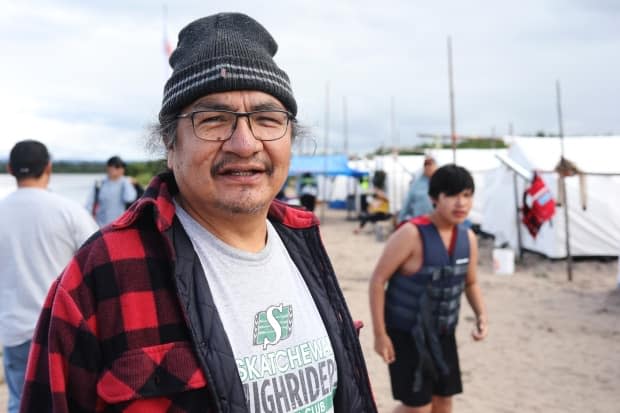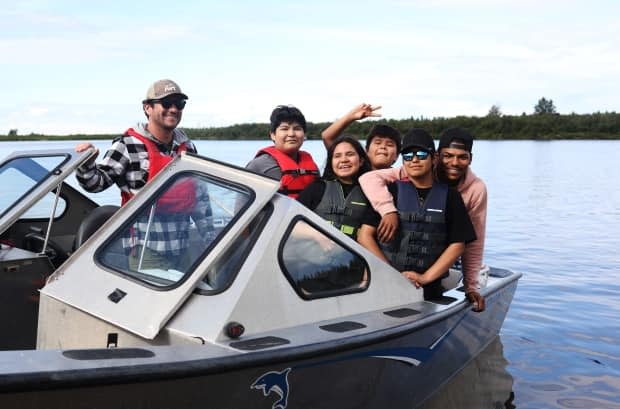Culture camp pilot program immerses youth in Innu culture, traditions

On an island on Kenamu River in central Labrador, several tents are strung up on the sand.
For the 15 youths attending a cultural pilot program, it's a place were they're free to run, play and learn — on the same land where their Innu ancestors once camped and hunted.
"It's healing. Being in here for these past couple of nights. It feels like it's your body and your mind is healing," storyteller Yvette Michel said. "It's medicine being in the country."
The youths were living on the land as part of the Nutshimit Cultural Program run by the Sheshatshiu Innu First Nation. The pilot program, which ran Aug. 22-26, brought storytellers, young adults and elders together.

Grayor Sillitt, 13, said he wanted to be around other kids his age but also learn about his culture — "how they used to chop wood, how they used to go hunting," he said.
It's important to learn to keep their roots alive, he said. Grayor said he's also learned he's the type of person to always help out, just like his parents.
"Being out on the land is really incredible," he said.
Jack Penashue, superintendent of Labrador's Mealy Mountains National Park, said colonization and assimilation have impacted the Innu people.
"Giving a little bit and showing that you know there's a better way of doing things, a better way of life," he said at the camp, "it's critical in the time of where we are right now in regards to all the challenges we face."

The route along the islands is a great fishing area and there are a number of artifacts from old campsites on each side of the lake, Penashue said. His parents travelled the route between Sheshatshiu Innu First Nation and the Mealy Mountains as well, he said.
"It's really, really important that we keep our Innu-ness alive and promoted in a way that's so that the young guys that are coming around the corner can experience a little bit of the flavour of what our fathers and our grandparents had lived," Penashue said.

At the camp each night there were stories and ghost stories around the fire. Storyteller Yvette Michel said she grew up going out to the country often and she was happy to see young people doing the same.
"The highlight for me is seeing these young youths are so interested in, you know the activities and sleeping in the tent," Michel said. "It's inspiring to watch and to inspire other young youth, I should say, to join in these activities."
The campers learned how to set up the Innu tents, how to fish and how to make Innu doughnuts, while taking a break from electronics, Michel said. She said she hopes the youths ask for more traditional camps throughout the year.

Shipu Penashue, 26, said he was glad to see the participants smiling and enjoying themselves.
"It keeps the tradition alive and so that they don't forget where they come from," Penashue said. "So they don't forget that they're Innu. Being Innu means a lot."

Shipu said he's grateful to see cultural programs available because there weren't a lot when he was younger. Having recently been in addictions treatment program, he said, being immersed in his culture has helped his own recovery journey, as it's a reminder of the responsibilities he has as an Innu person.
"I forgot a lot about this stuff when I was out there doing the stuff that I shouldn't have been doing," said Shipu, who said he was more than two months sober. "And by doing all this stuff, it brings joy in my life, brings a lot of happiness in my life as well."


